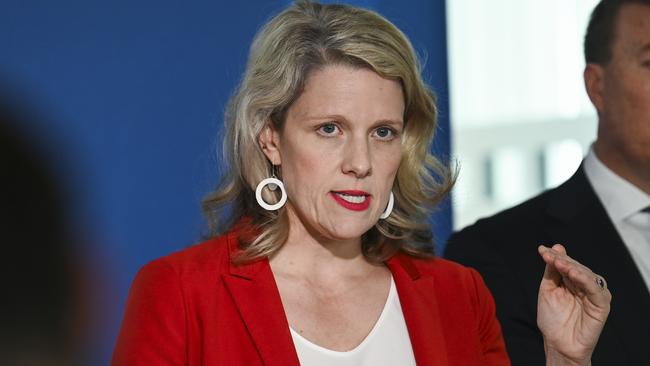Nearly 50,000 Indian students can avoid visa clampdown
Nearly 50,000 Indian students will escape a key measure in the federal government’s clampdown on international student visas.

Nearly 50,000 Indian students now in Australia will escape a key measure in the federal government’s clampdown on international student visas because of a Morrison government agreement with India that guaranteed the conditions applying to post-study visas for Indian students.
In a major embarrassment, Home Affairs Minister Clare O’Neil is unable to fully implement the commitment in her migration strategy, announced on Monday, to cut the length of temporary visas that allow international students to stay in Australia after graduation.
Indian education agents are already exploiting the loophole with promotion campaigns to make Indian students aware that they can partially avoid the Australian visa crackdown.
The migration package says post-study visas for international students who do a masters degree by coursework will be cut from three years to two years and for PhD degrees from four years to three years.
Ms O’Neil’s office confirmed on Friday that these two measures could not be applied to Indian students because of a commitment in the Australia-India free-trade agreement signed by then trade minister Dan Tehan in April 2022, just before the Coalition lost the May 2022 election.
In side letters to the agreement, exchanged with Indian Commerce and Industry Minister Piyush Goyal, Mr Tehan agreed to maintain specific lengths for temporary graduate visas, including three years for a masters by coursework and four for a PhD.
He also committed to three year temporary graduate visas for Indian students who graduated with first-class honours from bachelor degrees in science, technology, engineering, maths and information technology fields
International Education Association of Australia chief Phil Honeywood said on Friday that there was “clearly a downside to a trade minister running around the world trying to stitch up a free-trade agreement on the eve of a national election”.
“The Indian government clearly were aware that an election was in the offing and negotiated hard, to secure from then trade minister Dan Tehan what they wanted,” he said.
“In all this, both major parties need to be reminded that we must have a more bipartisan approach to this crucial $40bn a year industry, which is critical to our diplomacy.”
Mr Tehan defended his role in negotiating the agreement. “The Australia-India free-trade agreement has been acclaimed by both sides of politics as being a ground-breaking agreement. It is the envy of the rest of the world,” he said on Friday.
The exemption for India will have a very significant impact because Indian students are the second most numerous in Australia, after Chinese, and they habitually use temporary graduate visas to stay on after graduation, something that is not as popular among Chinese students.
Currently 46,600 Indian students are in Australia studying masters degrees by coursework and 1,800 are studying PhD degrees and all these students are now eligible to use the loophole to avoid their post-graduation stay in Australia being shortened.
According to Ms O’Neil’s office, about 20,000 Indian students per year are expected to use the opportunity to remain in Australia an extra year.
The president of the Association of Australian Education Representives in India, Nishidhar Borra, said it was “good news” that Indian students would benefit from the free trade agreement. He said members of AAERI, which represents education agents working for Australian education institutions, “are very happy and excited”.
”High quality students seeking to study in Australia will be welcomed. It’s all very positive,” he said.
Indian newsite, The Print, said that Australian high commissioner to India Philip Green had confirmed to journalists in New Delhi on Monday that the commitments under the free trade agreement would be upheld regardless of what the migration strategy said about post-study work rights.
The government had inserted a sentence in its migration strategy document which referred obliquely to the issue.
“The government will ensure these changes (to temporary graduate visas) are consistent with Australia’s obligations under international trade agreements,” it said without further explanation.




To join the conversation, please log in. Don't have an account? Register
Join the conversation, you are commenting as Logout